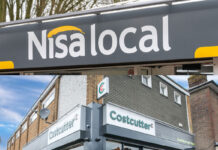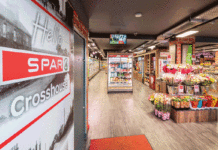Costcutter to take on Mace Stores and P&H to deliver to combined list as new deal signals major change in c-store industry
SYMBOL convenience store chain Costcutter Supermarkets Group and wholesaler Palmer & Harvey are to launch a joint venture buying company that the companies say will have £5bn negotiating and buying power. And the firms have also agreed further details of a new relationship which will have far-reaching effects on the c-store industry in Scotland and elsewhere in the UK.
Called The Buyco, the new company will be owned in equal shares by Costcutter and P&H. The formation of the new firm and other developments signal the end of the current relationship between Costcutter and the mutually owned buying group and wholesaler Nisa. Under new operations P&H’s current symbol stores, including those that run under the Mace Fascia, come under the wing of Costcutter. P&H will take over wholesaling operations – through its 14-depot, multi-temperature UK delivery network – to the combined store portfolio, which will be one of the largest groupings of symbol outlets in the UK. The Buyco will also buy on behalf of P&H’s current independent retail customers.
P&H’s Mace, Supershop and Your Store brands, their operations and 800 stores will join the Costcutter Supermarket Group family of brands – which includes more than 1,600 Costcutter, myCostcutter, kwiksave and other stores – on 7 April this year.
Costcutter has signed an eight-year wholesale distribution contract with Palmer & Harvey. The Costcutter stores operation will introduce a new bespoke product range for its expanded list of stores, negotiated by The Buyco and including an extended range of fresh and chilled goods and a three-tier own-label product portfolio, intended to provide own-brand options in all product categories. And Costcutter says the new buying power offered through The Buyco will also see it extend its regional product ranges and allow it to seek “the best deals and promotions available in the industry”.
The partners say wholesaling by Palmer & Harvey will ensure consistent and accurate delivery times, no delivery surcharge, no special-order charge, no levy charge for ‘low orders’ or ‘no orders’, the option for delivery in cages to be brought into store by drivers, and the reassurance that because of its nationwide network of depots, the company can retain a high level of customer service should there be a problem at any single site.
Martyn Ward, current managing director, commercial and sales at Palmer & Harvey becomes CEO of The Buyco. He said: “We will be working closely with suppliers, both those already working with Palmer & Harvey and new suppliers that we will be bringing on board to meet the needs of Costcutter Supermarkets Group members and all of P&H’s existing independent retailers, to ensure we are providing not simply the largest range but the highest-value range possible.”
Darcy Willson-Rymer, CEO of Costcutter Supermarkets Group, said: “We have been single-mindedly focused on creating maximum value for our members and it became wholly apparent that without access to the proportionate benefits of our own buying power this could not happen.
Chief executive of Palmer & Harvey, Chris Etherington said: “The core of our business has always been world class ‘last mile’ delivery to retail stores in every postcode, every day. By divesting our retail operation to Costcutter Supermarkets Group, we can now focus all our energies on extending the delivery benefits already enjoyed by our Mace, Supershop and Your Store retailers to the wider Costcutter Supermarkets Group.”
Costcutter currently accounts for a considerable proportion of wholesale business at member-owned Nisa but had been known to be considering its options ahead of that contract ending in 2014. Some observers expect the new developments to be the first of several that will see Britain’s independent and symbol-store wholesale and retail industry consolidate significantly in coming years.
While symbol stores have shown significant growth in recent times, developed stronger promotional programmes and presented stronger brands and higher store standards to consumers, the number of independent stores available to switch to symbol operation has declined. Some symbol operations are putting considerable efforts into attracting stores from rivals. Those developments combined with increasing competition from the fast-growing convenience-store estates of major multiple grocers mean that many industry experts expect more symbol takeovers and mergers.

















